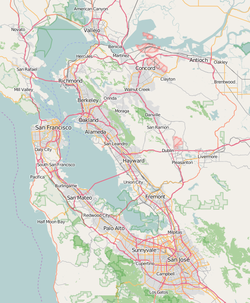Medical clinic
In 1924, Dr. Russell Van Arsdale Lee (1895–1982) went into medical practice with Dr. Thomas Williams at an office located at Bryant Street at Hamilton Street in Palo Alto. [2] [4] However the medical clinic grew quickly and they decided to partner with a team of new doctors and move the clinic to a larger space. [2] As a result, the Palo Alto Medical Clinic was founded in 1930 by Russell V. Lee, and five other doctors. [4] The early doctors and founding partners to form the clinic included Edward "Fritz" Roth, Blake Colburn Wilbur, Herbert Niebel, Milton Saier, and Esther Bridgman Clark. [2]
In 1927, pediatrician Esther Clark became a founding partner of the clinic, she was one of the first female doctors on the San Francisco Peninsula, and she went on to later found the Children's Health Council of Palo Alto. [5] [6]
Palo Alto Medical Clinic was an early place for innovations in medicine, they pioneered the model of group practice, and was a predecessor to the Palo Alto Medical Foundation. [2]
Arnautoff murals
In 1932, Russell V. Lee commissioned artist Victor Arnautoff to paint a series of fresco paintings around the entrance of the building. [8] [9] Arnautoff's mural series all were medically-themed murals done in the recessed under a loggia with four panels of modern medicine and other panels showing primitive medicine, and additionally he four painted medallions of Joseph Lister, Hippocrates, Louis Pasteur, and Wilhelm Röntgen are on the exterior wall of the loggia. [9] [10] The four murals done in color feature modern medicine and depict Luther Emmett Holt, William Osler, and Harvey Cushing. [9] The unveiling of these murals caused a traffic jam and some controversy, in part because one of the murals showed a doctor examining a female patient whose bare breasts were at eye-level. [11] [12]




